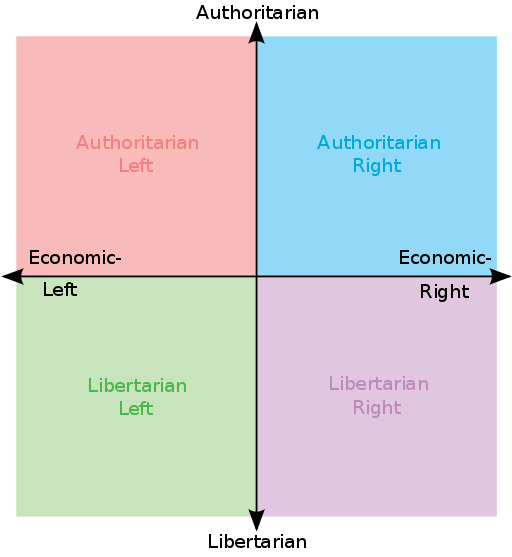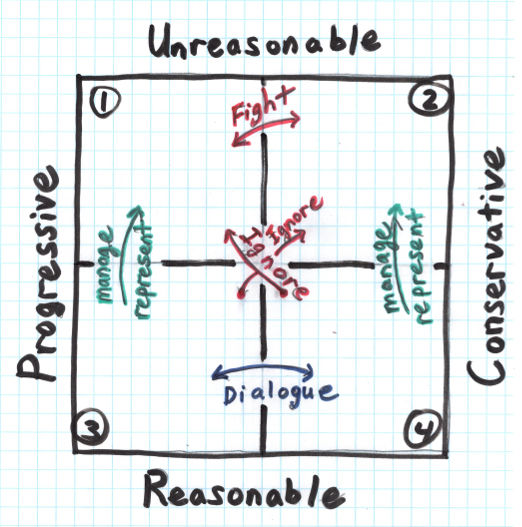Media
The Twitter Compass
Here's an approach to engaging (and ignoring) others on social media.
Posted March 1, 2018
This post is for people who wish they could have more reasonable political discussions on social media, and fewer that end in the words "Nazi" or "Libtard".
Toward the end of the post I'll make some recommendations for engaging and ignoring others on platforms such as Twitter. But first I want to discuss something called the "Political Compass", and then I want to discuss a near cousin of it that I will call the "Twitter Compass".
Here is the Political Compass.

When most people talk about politics, they discuss the "left" and the "right". The left is where you'll find Democrats (and Communists), and the right is where you'll find Republicans (and neo-Nazis).
A person can be far left. They can lean left. They can be in the center. They can lean right. And they can be far right. And, if you're going to place all political positions on a single dimensions the left-right continuum isn't bad.
But sometimes the left/right axis is too crude an instrument all on its own to support productive political discussions. What, for instance, do you do with Libertarians, who are economic conservatives, but who are quite progressive on lifestyle issues? And how do you distinguish between democratic tax and spend liberals and authoritarian Communists?
With things like this in mind, the folks who designed the political compass added an extra dimension to the familiar left-right axis. This is the authoritarian/libertarian axis. This allows us to note that Communists and tax and spenders are similar in being on the progessive end of the left-right axis, but are opposites with regard to the way individuals relate to their government.
There are pros and cons to using the political compass. In my view it allows for a lot more nuance if everyone is familiar with it. But you'll probably find yourself constantly making distinctions between authoritarians and libertarians if they're not.
If you're curious about where you fit in, you can take a test here.
What I really want to do is present to you a near cousin of the political compass.
The Twitter Compass
Here is the Twitter Compass:

It's still got the familiar left/right (or progressive/conservative) axis. But, instead of an authoritarian/libertarian axis, I added in a reasonable/unreasonable axis.
It's not that I don't think the authoritarian/libertarian axis is important. It is. But it's not as familiar as either left/right or reasonable/unreasonable, and my concern here is to manage our interactions with other people. And that has everything to do with how reasonable they are.
To use this compass, just ask yourself if you are more progressive or more conservative. And then ask yourself whether you're reasonable or unreasonable (I'm going to go ahead and assume that all of my readers are reasonable).
Once you locate yourself, just follow the corresponding strategy:
If you are a reasonable progressive:
- Seek out reasonable conservatives for dialogue.
- Ignore, mute, and block (in that order depending on circumstances) unreasonable conservatives.
- Manage and represent unreasonable progressives.
If you are a reasonable conservative:
- Seek out reasonable progressives for dialogue.
- Ignore, mute, and block (in that order, depending on circumstances) unreasonable progressives.
- Manage and represent unreasonable conservatives.
If you are an unreasonable progressive:
- Fight with every conservative you can.
- If reasonable conservatives are ignoring you, as they should, that will mean you are mostly fighting with unreasonable conservatives.
If you are an unreasonable conservative:
- Fight with every progressive you can.
- If reasonable progressives are ignoring you, as they should, that will mean you are mostly fighting with unreasonable progressives.
The model here is actually pretty simple. It can be summed up as "let the kids fight while the adults work stuff out." If your kids are fighting with the neighbor kids, it's best to limit your direct interaction with the neighbor kids (unless there's some imminent safety risk or something) and deal instead with their parents. Don't go after their kids directly, that will just make the other parent defensive, and won't be very productive anyhow. You deal with your own brats, and they deal with theirs.
The "Bubble" Worry
If you are reasonable, then you probably want to try to see both sides of things. And you might worry that ignoring some of the people on the other side might cause you to ignore some of the issues on the other side. And you will wind up living inside an insular bubble filled with others who all think like you do.
This is a good thing to worry about. And, if you ignore reasonable people on the other side, you should be worried about being in a bubble. On the other hand, if you ignore unreasonable people on the other side, a case can be made that you will actually become less partisan.
If you're constantly tussling with unreasonable folks on the other side, it taints your view of the other side. You can start to think everyone on that side is unreasonable. And that's just not true. Plus you have limited time and attention, and dealing with insults and derailments takes away from the amount of time and attention you can devote to having reasonable dialogue with reasonable people on the other side.
Dealing With Unreasonable People On Your Own Side
Now, why not simply ignore all the unreasonable people—even the ones on your own side? If you're a reasonable progressive (or conservative), why should you pay any attention to unreasonable progressives (or conservatives)? Two reasons. You need to represent their interests. And it's your job to manage them to some extent.
Why represent them when they frequently make such unreasonable demands? Because you know (better than the reasonable folks on the other side do) that your problem children actually have legitimate interests that need to be represented. Their problem isn't that they don't have some good points. It's that they either don't know how to present them reasonably, or they aren't constitutionally able to do so, or they've adopted an activism philosophy that favors force over reason.
None of those things invalidates their core concerns. And, since you're the one on your side who is reasonable, it's up to you to represent those interests in the reasonable discussion channel of political discourse.
What about "managing your side"? What does that even mean? And why should you do it? Isn't that kind of pretentious to think that you're the reasonable one and they need to be managed?
By "managing your own side," in the context of social media discussions, I'm mostly talking about calling unreasonable people on your side out for their unreasonableness (while still representing their valid concerns).
If you post something, and followers on your side dog-pile on the other side with overgeneralizations, demonizations, bad analogies, weak-manning (or "nut-picking"), and insults, don't just sit back and let them go, call them out for their bad behavior. This is a good faith gesture to the reasonable people on the other side. If you make that gesture, and they make that gesture in managing their own problem children, it will be easier to trust each other. Otherwise, the unreasonable forces will dominate the interaction.
But isn't that elitist? Won't the unreasonable folks on my side think I think I'm better than them because I'm trying to be more reasonable than they are? Furthermore, isn't there a risk that they'll consider me a traitor and turn some of their wrath toward me? Sure. Both those things are possible. But since you're the reasonable one, you'll figure out a way.
What Does It Mean To Be "Reasonable"?
I've been using the term "reasonable", and haven't defined it. Doesn't everyone think they're being reasonable? Who's to say what it means to be reasonable?
Well, I'll tell you what I mean. If you disagree, you can argue with me (reasonably, by my standards, please) in the comments here, or on Twitter.
To a first approximation, I mean "able to be reasoned with".
I'd like to point out that this does not mean "agreeable". It does require some degree of civility, but you can be civil and disagree. In fact, reasonable dialogue requires disagreement. The person who always agrees is generally just as "unreasonable" in this sense as the person who always disagrees.
It also doesn't mean being rational. Reasonable people can make logical errors and commit fallacies. But, these mistakes are easily corrected in reasonable dialectic. If I overgeneralize and am reasonable, others will bring up counterexamples, and I'll modify my claim. No harm, no foul. When people are being reasonable, the group can often be more rational than the individual participants.
More specifically, being reasonable means some of the following:
- You listen to the other side when it is their turn.
- You actually try to understand what they are saying.
- You try to be charitable in interpreting their words.
- You don't twist their words and look for excuses to become outraged about things they probably didn't intend.
- You don't assume someone is stupid or evil simply because they disagree with you. You are open to the idea that they might be considering some facts that you aren't.
- You are willing to change your mind (at least sometimes), if you think the other person has presented good reasons.
- You are willing to try to change their mind (at least sometimes), if you think you have good reasons.
- You explicitly take things back or modify your claims when they don't stand up to scrutiny.
- You give them the freedom to be wrong or take things back without mocking or gloating.
- You don't insult them or attack their character. You engage with their reasons.
- You try not to change the subject to evade their good reasons.
- And so on. I don't have a complete list. But those are some of the highlights.
And, if you're going to show your discussion partner that kind of respect, it's only fair that you demand that kind of respect in return.
A final note here: I wouldn't be too fast to label someone unreasonable. Definitely consider them reasonable until they prove otherwise, and maybe have something of a three-strikes policy, unless they do something truly egregious.
What's so good about being "Reasonable"?
What's so good about being reasonable anyway? Aren't we at war with the other side? In short, the story of civilization is a story about how reasonableness came to replace war. And, rather than make the case for that myself, I'll refer you to "In Favor of Niceness, Community, and Civilization" by Scott Alexander.
If you'd like to keep up with my posts and articles (and maybe even engage me in reasonable argumentation now and then), follow me on Twitter.




